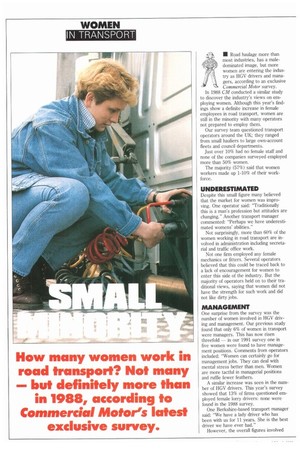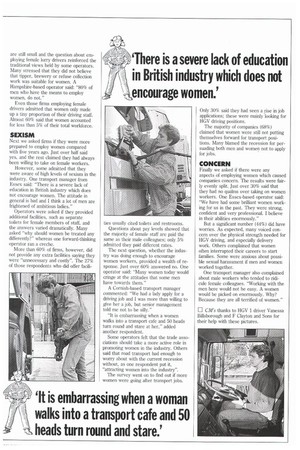• Road haulage more than most industries, has a maledominated
Page 40

Page 41

If you've noticed an error in this article please click here to report it so we can fix it.
image, but more women are entering the industry as HGV drivers and managers, according to an exclusive Commercial Motor survey.
In 1988 CM conducted a similar study to discover the industry's views on employing women. Although this year's findings show a definite increase in female employees in road transport, women are still in the minority with many operators not prepared to employ them.
Our survey team questioned transport operators around the UK; they ranged from small hauliers to large own-account fleets and council departments.
Just over 10% had no female staff and none of the companies surveyed employed more than 50% women.
The majority (57%) said that women workers made up 1-10% of their workforce.
UNDERESTIMATED
Despite this small figure many believed that the market for women was improving. One operator said: "Traditionally this is a man's profession but attitudes are changing." Another transport manager commented: "Perhaps we have underestimated womens' abilities."
Not surprisingly, more than 60% of the women working in road transport are involved in administration including secretarial and traffic office work.
Not one firm employed any female mechanics or fitters. Several operators believed that this could be traced back to a lack of encouragement for women to enter this side of the industry. But the majority of operators held on to their traditional views, saying that women did not have the strength for such work and did not like dirty jobs.
MANAGEMENT
One surprise from the survey was the number of women involved in HGV driving and management. Our previous study found that only 6% of women in transport were managers. This has now risen threefold — in our 1991 survey one in five women were found to have management positions. Comments from operators included; "Women can certainly go for management jobs. They can deal with mental stress better than men. Women are more tactful in managerial positions and ruffle fewer feathers.
A similar increase was seen in the number of HGV drivers. This year's survey showed that 13% of firms questioned employed female lorry drivers: none were found in the 1988 survey.
One Berkshire-based transport manager said: "We have a lady driver who has been with us for 11 years. She is the best driver we have ever had."
However, the overall figures involved are still small and the question about employing female lorry drivers reinforced the traditional views held by some operators. Many stressed that they did not believe that tipper, brewery or refuse collection work was suitable for women. A Hampshire-based operator said: "80% of men who have the means to employ women, do not."
Even those firms employing female drivers admitted that women only made up a tiny proportion of their driving staff. Almost 60% said that women accounted for less than 5% of their total workforce.
SEXISM
Next we asked firms if they were more prepared to employ women compared with five years ago. Just over half said yes, and the rest claimed they had always been willing to take on female workers.
However, some admitted that they were aware of high levels of sexism in the industry. One transport manager from Essex said: "There is a severe lack of education in British industry which does not encourage women. The attitude in general is bad and I think a lot of men are frightened of ambitious ladies."
Operators were asked if they provided additional facilities, such as separate toilets for female members of staff, and the answers varied dramatically. Many asked "why should women be treated any differently?" whereas one forward-thinking operator ran a creche.
More than 60% of firms, however, did not provide any extra facilities saying they were "unnecessary and costly". The 27% of those respondents who did offer facili ties usually cited toilets and restrooms.
Questions about pay levels showed that the majority of female staff are paid the same as their male colleagues; only 5% admitted they paid different rates.
The next question, whether the industry was doing enough to encourage women workers, provided a wealth of response. Just over 60% answered no. One operator said: "Many women today would cringe at the attitudes that some men have towards them."
A Cornish-based transport manager commented: "We had a lady apply for a driving job and I was more than willing to give her a job, but senior management told me not to be silly."
"It is embarrassing when a women walks into a transport cafe and 50 heads turn round and stare at her," added another respondent.
Some operators felt that the trade associations should take a more active role in promoting women in the industry. Others said that road transport had enough to worry about with the current recession without, as one respondent put it, "attracting women into the industry".
The survey went on to find out if more women were going after transport jobs. Only 30% said they had seen a rise in job applications; these were mainly looking for HGV driving positions.
The majority of companies (68%) claimed that women were still not putting themselves forward for transport positions. Many blamed the recession for persuading both men and women not to apply for jobs.
CONCERN
Finally we asked if there were any aspects of employing women which caused companies concern. The results were fairly evenly split. Just over 30% said that they had no qualms over taking on women workers. One Essex-based operator said: "We have had some brilliant women working for us in the past. They were strong, confident and very professional. I believe in their abilities enormously."
But a significant number (44%) did have worries. As expected, many voiced concern over the physical strength needed for HGV driving, and especially delivery work. Others complained that women often interrupted their careers to start families. Some were anxious about possible sexual harassment if men and women worked together.
One transport manager also complained about male workers who tended to ridicule female colleagues. "Working with the men here would not be easy. A women would be picked on enormously. Why? Because they are all terrified of women."
Li CM's thanks to HGV 1 driver Vanessa Billsborough and F Clayton and Sons for their help with these pictures.












































































